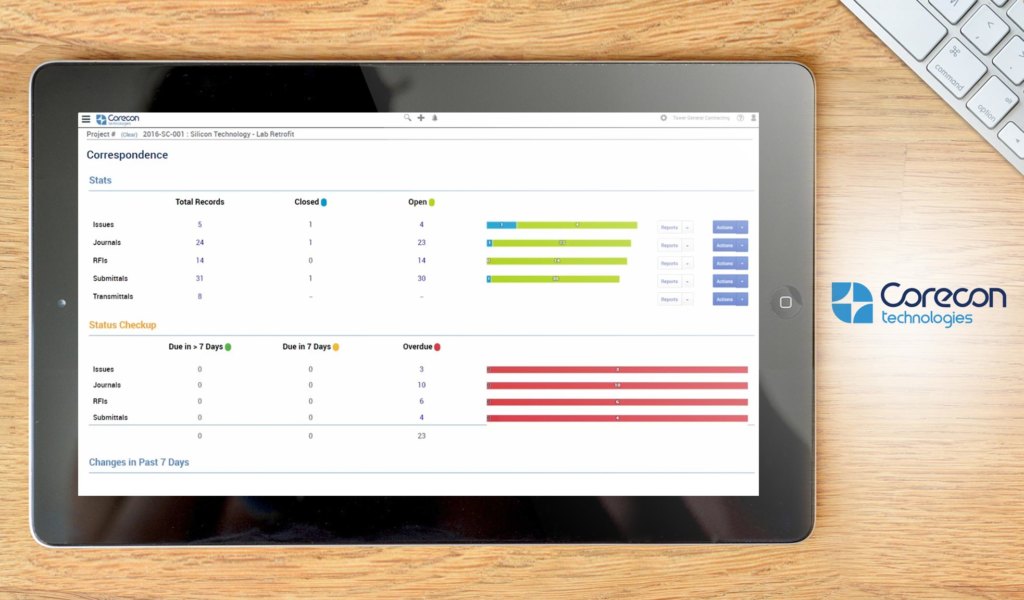Construction management software is a project management platform that helps companies with processes like budget management, communication, decision-making, and job scheduling, to name a few. Its goal is to make construction business processes a lot easier through automation.
Despite its growing popularity among builders big and small, construction management software has remained a virtually untapped technology for many construction companies. The persistent question has always been what is construction management software?
Aimed at making construction business processes easier, construction management software, by definition, is a project management tool designed specifically for construction professionals. This kind of software offers a range of benefits to members of the construction industry, streamlining processes that used to be done manually, which include communication, decision-making, and job scheduling, among others. These are but some of the benefits that organizations can get from using construction management software.
Such is the definition of construction management software. It is very much apparent that this secret is out as more and more construction firms are using this tool. In fact, the global construction management software market is forecast to grow at a CAGR of 9.19% from 2018-2022. So this effectively answers the query: what is construction management software?
Construction Management Software Guide Table of Contents
- Benefits of Construction Management Software
- Features of Construction Management Software
- Why Use Construction Management Software
- Types of Construction Management Software
- Examples of Construction Management Software
- Construction Management Software Cost
- Latest Trends in Construction Management Software
A notable rise in construction management software demand is seen to come from the oil and gas sector. Members of the industry have found the solution to be very helpful in their construction projects. This is owing to the fact that it helps boost transparency in brownfield, onshore, and shale construction projects. In the same manner, the software also helps in maintaining oil and gas plants and deepwater oil and gas developments. This demand is also seen to fuel the construction management software market. With this rise in the clamor for construction management solutions also comes buyer preferences in terms of features and capabilities.
As most of these tools are deployed via cloud technology, businesses have also realized the savings they can make from investing in construction management solutions. The app enables enterprises to significantly cut operational costs and improve product development and scalability. Cloud computing practices have recently been recommended by the United States Federal Risk and Authorization Management Program for their ability to reduce greenhouse gases. Such development is seen to further boost the development of cloud-based software.
Source: JB Knowledge Annual Construction Technology Report 2017
Benefits of Construction Management Software
More importantly than satisfying the question—what is construction management software?—is to answer the query, what does construction management do? There are far more benefits that businesses can reap from the use of construction management software, making it a sound investment for these companies. The benefits of construction management software include:
- Management Made Easier: The adoption of a systematic approach to management is every construction management software’s main goal. Being so, this solution allows staff to ensure that projects go smoothly in accordance with plans. It also enables personnel to come up with professional requests for information, transmittals, and submittals, among others. It allows key staff to share with each other vital data and project budgets, which can be monitored at the same time.
- Document Control: Construction firms process and store a lot of files and documents. Companies used to manage physical documents, storing them in file cabinets for safekeeping. With construction management software, however, this practice has become obsolete. Documents are now electronically processed and subsequently stored in document management systems, which are all part of construction management software.
- Information Access and Sharing: As all project management data are stored in a single place, access to pertinent information comes with a click of a mouse. Apart from this, audit log records, which show the date and time of document creation and modification, allow for easy monitoring of such documents and keep them from getting lost. Any employee who is relevant to a project can instantly access important data at any time.
- Construction Risk Assessment: By keeping project documents organized, construction management software helps managers identify and resolve potential risks before they even occur.
- Cost Control: Using its construction accounting capabilities, construction management software can help employees locate vital documents such as contracts, change orders, and budget status. This results in the minimization of project costs and prevents project errors that may lead to high costs. It likewise reduces operational costs and allows access to real-time financial data, which can make the company more profitable.
- Efficient Service Delivery: Viewed by many as the path to business success, construction management software is commonly integrated with construction accounting tools. As such, it enables managers to complete projects on time at the most suitable budgets. This solution, essentially makes all aspects of the construction industry as simple as can be. It effectively unifies the workforce, promotes efficiency, streamlines operations, and, ultimately, ensures profitability.
- Opportunity for Business Expansion: By promoting efficient business processes, construction management software use can help speed up project completion. This can result in business expansion by taking on more contracts. More jobs will lead to increased market share as more business in itself is tantamount to an efficient marketing campaign.
- Quality Improvement: Construction management software promotes construction security, which enhances project planning and control. It likewise minimizes project delays and promotes communication, which prevent costly errors.

Contractor Foreman helps you make estimates for projects.
Features of Construction Management Software
Construction management tools have significantly improved the construction sector in terms of productivity, efficiency, and company competitiveness. The features of construction management software typically help builders automate their work and documentation processes, which are essentially the purpose of construction management software. In this section, we do not just look at software features, we also try to give a picture of how construction management software works. Many programs integrated with such tools have taken over tasks previously held by project managers, design engineers, and architects. Construction firms at one time or another have used solutions in cost estimation, accounting, scheduling, and computer-aided design. These are but some of the advantages of construction management software. As vast as the features that some solutions may offer, essential functionalities that most companies need must be fulfilled. Here are some of them:
- Accounting: As project cost and expenditures must be closely monitored, a project construction software must be able to integrate with other business accounting tools. This feature helps managers handle multiple projects at any given time. It must likewise be able to automate processes such as accounts receivable, payable, and payroll, among others while being able to adjust in accordance to client preference.
- Job Costing: A construction management solution must be capable of setting standard rates for company services, defining costs, and monitoring time expenses. This functionality should also manage project schedules and boost productivity.
- Service Management: The ideal construction management software must be able to manage and dispatch work orders, create schedules, allocate assets and resources, and book jobs. Advanced solutions, meanwhile, have the capability to assign jobs to the nearest technicians as they are equipped with GPS technology.
- Project Management: This feature basically automates every detail of construction project management. These include resource planning, team collaboration, project progress tracking, and integration of incoming client requests. Automation of resource management across a number of projects and project schedule updating is also achieved.
- Job Scheduling: This functionality aids in task scheduling and equipment, or worker allocation over multiple projects. It must also be able to balance workloads while being capable of immediately rebalancing when needed. Laying out project timelines and allocation of resources and manpower should also be addressed by such a system.
- Reporting: Construction management software should be able to give managers control over project data. Decision-making and the creation of data reports are also enhanced through the creation of project analytics reports. This capability produces real-time, accurate data reports and can export them to third-party software. These in turn aid managers in evaluating project status and risk identification.
- Document Management: A key feature of construction management software is its ability to manage pertinent documents. Such software enables companies to create workflow data reports using a single platform. Doing so greatly helps boost productivity, workflow processes, and information security. The system should also be able to integrate with other business productivity tools.
- Inventory Management: Inventory management capability essentially eliminates write-offs, does quick inventories, quickly finds lost inventory, and monitors on-site assets. It likewise assists project managers in resource and equipment distribution.
- Equipment Management: This feature enables managers to not only allocate equipment across projects but it can also likewise record equipment maintenance needs and identify which equipment can be deployed. It also allows for the streamlining of maintenance and schedules, ensuring performance and boosting efficiency. Alerts are also sent out during situations when specific equipment is required.
- Mobile Capabilities: Lastly, construction management software must be able to support both desktop and mobile devices. This is usually accomplished by software deployed using cloud technology. With this capability, key personnel can access data even from job sites. Meanwhile, web-based software facilitates a review of project specifications, equipment and worker schedules, and job progress, among other considerations. It can help managers make quick decisions without having to go back to the office to consult the departments involved.
Why Use Construction Management Software
To answer the question “why use construction management software?” we have collated some of the reasons why these solutions can make builders better at providing services. These include:
- On-Site Accessibility: Most cloud-based construction management tools can be accessed from virtually anywhere at any time. This effectively eliminates worries about timely job completion and the need to go to the office to rush tasks.
- Working With Teams and Other Groups: With construction management tools, project managers can huddle with teams, subordinates, and suppliers, among other key groups. This will result in smooth workflows and accurate job estimates. Its online nature will enable much-needed collaboration among those involved in a particular project.
- Accurate Monitoring: Construction management solutions can accurately monitor everything about a construction business. These include suppliers and equipment and supplies that are needed to complete a job on time. This likewise leads to improved service quality by boosting team workmanship.

monday.com is a good example of an app capable of visual task management.
Types of Construction Management Software
Construction management software comes in several types, each designed to meet specific needs in managing construction projects. Here’s a breakdown of the main types:
- Cloud-Based Construction Management Software: Cloud-based software is hosted on remote servers, allowing users to access the system from anywhere with an internet connection. This type offers flexibility, scalability, and real-time updates, making it ideal for teams working remotely or across multiple job sites. Examples include Procore and Buildertrend, which enable collaboration and seamless data sharing between project managers, subcontractors, and clients.
- On-Premise Construction Management Software: On-premise software is installed locally on a company’s servers and computers. It offers greater control over data security and may be preferred by companies that handle sensitive information or have specific regulatory compliance requirements. However, it requires upfront investment in hardware and ongoing maintenance. Examples include Sage 300 Construction and Viewpoint Vista, which offer advanced project management capabilities for larger firms.
- Hybrid Construction Management Software: Hybrid solutions combine elements of both cloud-based and on-premise software, offering the flexibility of cloud accessibility with the security and control of local installations. This option is suitable for businesses that need remote accessibility and data privacy. Hybrid systems also integrate with various enterprise resource planning (ERP) systems to streamline workflows.
Each type has its own benefits depending on the construction business’s size, needs, and budget. Cloud-based software is often ideal for smaller companies or those with distributed teams, while on-premise solutions are suited for larger firms with more complex needs. Hybrid systems offer the best of both worlds for organizations that require flexibility and security.
Examples of Construction Management Software
There are many construction management software out in the market today. These solutions have their individual strengths and weaknesses. Prospective users should pick out what they think would best suit their operations. Here, we take a look at some examples of construction management software.
ContractorForeman
Contractor Foreman, a cloud-based construction management solution, covers everything you need to keep your operations running smoothly. With it, you can keep track of project progress, finances, scheduling, and even safety protocols and access them from any device. You can integrate it with MailChimp, ClickUp, WePay, Outlook 365, Quickbooks, Gusto, and more. Packages start at $49 per month.
monday.com
monday.com is a project management software that uses color and placement to streamline workflows, making project management fun and easy. The boards help you keep track of tasks and projects from start to finish, and since all communication takes place on each board, sharing files and ideas is a breeze. You can integrate monday.com with Slack, Zoom, Microsoft Teams, Google Drive, LinkedIn, Zapier, Adobe Creative Clouds, etc. Price starts at $8 per seat per month.
Corecon
Corecon is a cloud-based construction estimation, project management, and collaboration platform. Its executive dashboards can give you an overview of time-sensitive tasks, documents, and financials. Meanwhile, CoreconLink utilities transfer project financials using a sync wizard, thus eliminating duplicate data entry and maintaining organization-wide consistency. Use it with QuickBooks, Sage 50 Canada, SAP Business One, and Xero. Packages are personalized, so you need to request a quote.
Wrike
Wrike Construction Management Software is an all-in-one solution that gives you plan visualization, resource allocation, and time tracking solutions. It can help you simplify complex construction projects and see the big picture of your operations. The platform is also intuitive and easy even for beginners to use. You can integrate it with various software ecosystems to meet your specific business needs. It offers a free plan, but packages start at $9.80 per user per month.
CoConstruct
CoConstruct is a tool that serves as a custom builder and remodeler, optimizing builders’ daily operations. Its three modules help builders and remodelers tackle common project challenges like budgeting, client communication, scheduling, and activity planning. With it, you can control orders, budgets, bids, and even specific selections. It is entirely cloud-hosted, and you can integrate it with your accounting software for more efficient processes. Prices start at $199 per month.
Construction Management Software Cost
While it’s true that the cost of construction management solutions can entail a lot more than conventional software that construction firms are used to, the features and automation benefits that these tools deliver can help businesses save money in the long run.
The usual point products that most companies use may cost more as more investments are required because automation tasks may vary. With construction management software, most known issues are addressed and with the range of tools that commonly come with such a platform, additional software purchases are kept at a minimum.
In-house construction management software can cost companies anywhere between $10,000 to $50,000 depending on company size and functionalities that are required. This may sound much but such investments can easily be recouped considering the cost reductions and improved biddings that come as a result of using this solution.

Corecon lets you customize your dashboard so you can have an overview of your time-sensitive tasks, documents, and financials.
Latest Trends in Construction Management Software
The global construction management software market has been forecast to grow at a CAGR of 13.7% from the year 2017 through 2021. This growth is seen to be fueled by increased demand from the APAC region, specifically the growth of the Chinese and Japanese construction markets.
Another factor that will drive market growth is the rise in the demand for construction management software in the utility sector. Oil and gas construction projects will require such software as it has been proven to be effective in the sector. The software has become popular in the maintenance of oil and gas plants. However, such market growth is seen to be hampered by the high costs associated with the software.

Potential Issues with Construction Management Software
With all its features and benefits, the use of construction management tools also has its downsides. These disadvantages usually impact small construction companies and are associated with software costs.
- High Software Cost: Small businesses may not be able to access some technologies due to their high cost. Despite the benefits outweighing these costs, Some solutions may prove to be very costly for small builders.
- New Software Implementation: Businesses are commonly required to allow time to train staff and implement new solutions. These can take up precious time owing to the lack of technical proficiency of some employees.
- Updates and Training: Despite the myriad of updatable and even upgradable construction management software, some solutions can become obsolete over time. This can only lead to additional investments in new solutions.
Key Insights
- Enhanced Efficiency: Construction management software significantly streamlines various construction processes such as communication, decision-making, and job scheduling, thereby improving overall efficiency.
- Market Growth: The global construction management software market is expected to grow at a CAGR of 9.19% from 2018-2022, with increased demand from the oil and gas sector and APAC regions.
- Cost Control: These tools help in meticulous cost management by integrating construction accounting capabilities, thereby minimizing project costs and preventing costly errors.
- Document Management: The software transforms document management by digitizing and storing documents, making them easily accessible and reducing the risk of loss.
- Real-Time Information: With all data stored in one place, the software allows for instant access to project information, facilitating timely and informed decision-making.
- Scalability: Cloud-based construction management software offers scalability and flexibility, allowing companies to expand their operations efficiently.
- Improved Collaboration: The software enables seamless collaboration among project teams, subordinates, and suppliers, leading to smoother workflows and accurate job estimates.
- Quality and Risk Management: It helps in improving project quality and assessing risks by keeping project documents organized and identifying potential issues before they occur.
FAQ
- What is construction management software?
Construction management software is a project management tool specifically designed for construction professionals. It streamlines various construction processes, including communication, decision-making, and job scheduling, among others. - Why should construction companies use construction management software?
It enhances efficiency, reduces operational costs, improves document management, facilitates real-time information access, and enables better cost control and risk assessment. - How does construction management software help with cost control?
The software integrates construction accounting capabilities, helping employees locate vital documents like contracts and budget statuses, thus minimizing project costs and preventing errors. - What are some key features of construction management software?
Key features include accounting, job costing, service management, project management, job scheduling, reporting, document management, inventory management, equipment management, and mobile capabilities. - Can construction management software be accessed on-site?
Yes, most cloud-based construction management tools can be accessed from virtually anywhere at any time, allowing project managers to complete tasks and make decisions without having to return to the office. - What are some examples of construction management software?
Examples include Contractor Foreman, monday.com, Corecon, Wrike, and CoConstruct. Each of these offers unique features tailored to the needs of construction projects. - What are the costs associated with construction management software?
Costs can vary widely; in-house solutions can range from $10,000 to $50,000 depending on the company size and required functionalities. However, cloud-based solutions often offer more flexible and affordable pricing plans. - How does construction management software improve document management?
The software digitizes and stores documents, making them easily accessible and reducing the risk of loss. It also allows for the creation and sharing of workflow data reports, enhancing productivity and information security. - What trends are driving the growth of the construction management software market?
Increased demand from the APAC region and the utility sector, especially oil and gas projects, is driving market growth. The adoption of cloud computing practices is also a significant trend. - What potential issues might arise with the use of construction management software?
High costs can be a barrier for small businesses. Additionally, implementing new software may require time for training and adjustment, and some solutions may become obsolete over time, necessitating further investment.


























It's strange to me that more people aren't taking advantage of construction management services, and I'm not surprised that cloud computing practices have become something that the US Federal Risk and Authorization Management Program recommends. My boss has just recently decided to start looking into getting a system for us, and I think that it will really streamline the chain of orders and communication, as you said. I'm impressed that they generally have cost control features, as well, and I can see how keeping all of the contracts and forms in the same place would help with that.
Leave a comment!